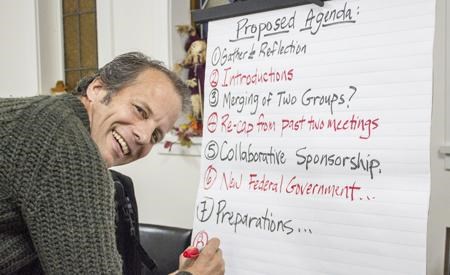A recent refugee aid meeting attended by City of Powell River officials and citizen groups resulted in a joint effort between all parties to address the goal of bringing refugees into the community.
More than 30 people gathered in Powell River’s Trinity Hall, October 26, for the second meeting of the Welcome Powell River Refugee Support Group, including members of city council and representatives from several church and community groups.
Mayor Dave Formosa began discussion around placing the citizen-led initiative under the umbrella of the city.
“We should have one group,” said Formosa. “We can work together and be one mothership.”
Formosa said if they decided to put the group under the city’s leadership, they could bring the initiative to the committee of the whole and council, as well as centralizing fundraising efforts, with the aim of eventually bringing five refugees families to Powell River.
Ron Berezan, meeting facilitator and representative of St. David and St. Paul’s Anglican Churches, asked if it made sense to bring the city and citizen initiatives together.
“You are proposing that the city would be another member, or a leader, what is the structure of that?” said Berzeran. “We are looking at a participatory process where different churches, community groups and individuals come together to maximize our reach in terms of refugee sponsorship.”
By the end of the meeting it was decided the groups would work with the city, but not under its leadership.
Instead, a working group composed of church, city and citizen members was formed to investigate a decision-making framework and determine how funds would be collected and managed.
Discussion among meeting attendees also touched on possible changes to Canada’s refugee process after the recent federal election.
Currently, several methods are available for groups to bring refugees into Canada, including being designated as a sponsorship agreement holder (SAH). There are 14 SAHs in BC, many of them church groups, who are able to sponsor refugees without official UN declared refugee status. The process of becoming an SAH takes approximately 2–3 years.
Councillor Karen Skadsheim spoke in favour of establishing the city as an SAH and setting up a long-term refugee aid process.
“There are a lot of people who want to help that aren’t affiliated with a faith-based organization,” said Skadsheim. “We could hold the central pot of money and with the city as a sponsorship agreement holder we could help groups in the community bring refugees over.”
Currently, no city or government bodies are listed as SAHs on the Canadian immigration and citizenship website.
Six Powell River area churches have the ability to access SAHs under wider church organizations: Pentecostal, Lutheran, Baptist, Anglican, Catholic and United.
While not all local churches have formally joined SAHs, Evangel Pentecostal Church volunteer Wendy Perkonig said her church has already been accepted as a sponsorship group under the SAH of the Pentecostal Assemblies of Canada.
Lyn Adamson, executive director of Powell River Diversity Initiative (PRDI), said her organization could serve immediately as a neutral, non-denominational, fundraising group with the additional benefit of being able to issue charitable receipts.
The newly formed community working group is composed of Adamson, retired United Church minister Doug Graves, retired Baptist pastor Ronald Lewis, Assumption Catholic Church parishioner Kate Cooper and councillor Rob Southcott. The group will be headed by St. David and St. Paul’s Anglican Churches representative Lee Coulter.
“We’ve all agreed to work as one group and now we have to figure out how that will work,” said Coulter.
The next public meeting of Welcome Powell River Refugee Support Group is at 7 pm, Monday, November 30, at United Church Trinity Hall. For more information, readers can go to facebook.com/PRRefugee.



